12 Most Healthy Drinks Besides Water as Recommended by a Nutritionist in 2026
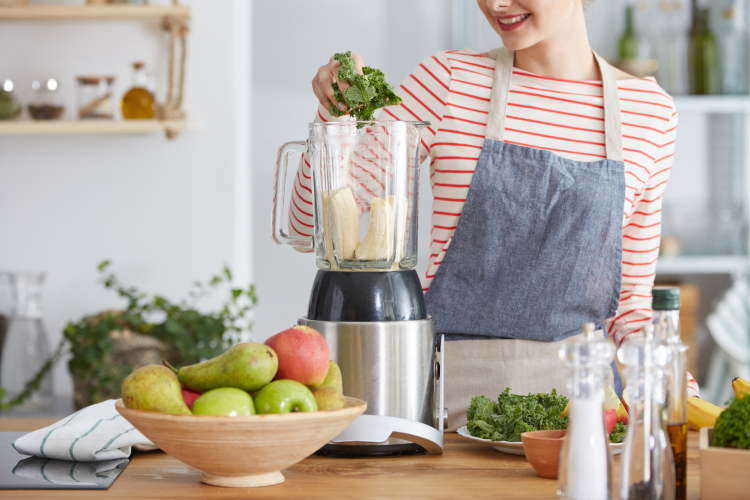
Are you searching for healthy drinks that aren’t water? Water is widely considered one of the healthiest beverages and it should be at the top of your list of drinks that are good for you.
Whether from the tap, bottle or filter, water supports normal digestion and circulation, helps regulate body temperature and transports oxygen and nutrients through the body. Plus, according to The Nutrition Source, it helps you maintain healthy skin while also lubricating your tissues and joints.
However, regardless of how healthy and essential water may be to your diet, it can be bland and sometimes you just feel like something a bit more exciting. If you’re getting bored with your daily hydration goals, keep reading to discover 12 nutritionist-recommended healthy drinks other than water to fill up your cup.
Jump to Section
- How We Choose the Most Healthy Drinks Besides Water
- The 12 Most Healthy Drinks Other Than Water
- What is the Healthiest Drink?
- What Drinks Should I Avoid?
How We Choose the Most Healthy Drinks Besides Water
At Cozymeal, we have over a decade of valuable experience in the culinary industry, connecting people with experienced service professionals. This has not only helped us become a trusted source for food-related events, but also to become a known authority for comprehensive guides on culinary topics, food industry news and health and nutrition.
When creating content, we ensure that everything is accurate, thanks to extensive research conducted by our editorial team. This guide to healthy drinks, in particular, features the viewpoints of nutrition experts who have relevant knowledge to share on healthy drinks besides water. We also took into account the views of our own team members who have tried these healthy drinks.
Additionally, our list of healthy drinks is based on the following criteria:
- Nutritional Value: We feature healthy drinks based on their nutritional value, which includes their vitamin, mineral, probiotic and antioxidant content.
- Added Sugar Content: We included healthy drinks based on their sugar content, with naturally sweetened or unsweetened options being more favorable.
- Calories: Our list of healthy drinks has those with the lowest possible calories, while still offering valuable nutrients.
- Hydration Benefits: We highlight healthy drinks that help people stay hydrated and contribute to their overall well-being.
Our final check to ensure we feature healthy drinks that meet key nutrition standards is an expert review by a Registered Nutritionist (ANutr) with the Association for Nutrition. The reviewer assesses nutritional value, verifies sources and ensures claims are evidence-based and balanced. This independent review helps us deliver a guide that is accurate, practical and useful.
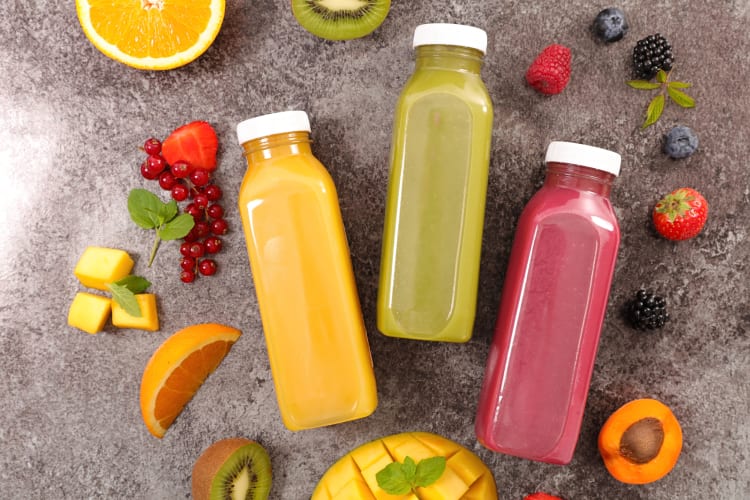
The 12 Most Healthy Drinks Other Than Water
1. Green Tea
Our first recommendation for flavorful and healthy drinks to drink instead of water is green tea. This excellent alternative comes from the unfermented leaves of tea plants, also known as Camellia sinensis. The leaves are either steamed or pan-fried to dry them out.
Like traditional black tea, green tea is available in both tea bags and loose-leaf forms. However, if part of your health goals includes reducing caffeine intake, you may ask: Does green tea have caffeine? Yes, this healthy drink does have a small amount of caffeine, but not as much as black tea and definitely not as much as coffee.
Green tea is a healthy drink that may feel calming for some; choose decaf if caffeine disrupts sleep. It also may support cognitive function and weight management and, according to the Cleveland Clinic, its polyphenols are being studied for cancer-related benefits.
Plus, if you’re feeling under the weather, this is one of the best teas for a sore throat. Just try to steer clear of sweetened green teas, as these have added sugars, which defeats the purpose of this being a healthy drink.
Green Tea Nutritional Overview (8-fluid-ounce serving, unsweetened):
- Calories: 0-2
- Protein: 0 grams
- Fat: 0 grams
- Carbs: 0-0.5 grams
- Total Sugar: 0 grams
- Caffeine: 20-45 milligrams

2. Coconut Water
As far as tasty beverages that are healthy go, coconut water is a terrific option, especially for athletes. This tropical healthy drink has a sweet and nutty flavor, and carbonated versions of coconut water are available if you prefer a bubbly beverage.
Mostly made up of water, coconut water provides some vitamins, amino acids, minerals and potassium, which, according to The Ohio State University, can help with blood pressure regulation. It also has electrolytes like magnesium and a little sodium, making it a healthy drink for light activity or everyday hydration.
It is usually lower in sodium than most sports drinks and may not replace them during prolonged, high-sweat exercise. To get the best coconut water, choose options with no added sugar or flavors.
Coconut Water Nutritional Overview (8-fluid-ounce serving):
- Calories: 45-55
- Protein: 0-1 gram
- Fat: 0 grams
- Carbs: 9-11 grams (3-4% DV)
- Total Sugar: 6-9 grams
- Caffeine: 0 milligrams

3. Beet Juice
Beet juice is packed with nitrates, vitamin C and folic acid, as well as magnesium, antioxidants and fiber. These may help lower blood pressure and support exercise performance, as documented by Integris Health.
However, beets do have a high level of oxalates, which may increase the risk of kidney stones, according to WebMD; so keep that in mind before adding beet juice to your list of healthiest drinks to try.
If you’re interested in trying it, you can buy bottled beet juice at your local market or grocery store. You can also make your own using a juicer to blend beets and water. Beet juice can have somewhat of a bitter or earthy flavor, so if you prefer a sweeter taste, we suggest blending in apple or orange slices for a healthy drink option that’s sure to please your taste buds.
Beet Juice Nutritional Overview (8-fluid-ounce serving):
- Calories: 70-100
- Protein: 2-3 grams
- Fat: 0-0.5 grams
- Carbs: 16-22 grams (6-8% DV)
- Total Sugar: 13-18 grams
- Caffeine: 0 milligrams
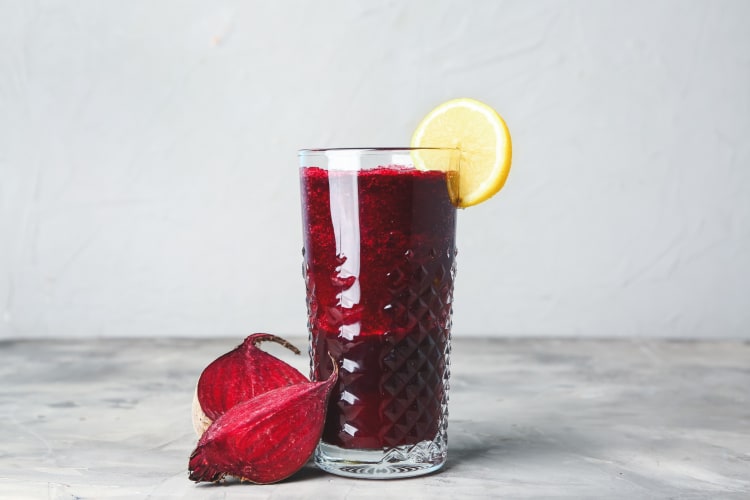
4. Cranberry Juice
For tart and tangy healthy drinks, look no further than the cranberry juice bottles lining the market shelves. This tasty, healthy drink contains antioxidants and vitamin C that may support heart health and cholesterol management. As Medical News Today points out, cranberry products may promote urinary tract health.
Because cranberry juice can be high in naturally occurring sugar and is higher in carbs than many healthy beverages, enjoy it in moderation and look for 100% unsweetened or no-added-sugar options. For a lighter sip, keep portions to 4–8 ounces or dilute with chilled water or seltzer.
Cranberry Juice Nutritional Overview (8-fluid-ounce serving):
- Calories: 100-120
- Protein: 0-1 gram
- Fat: 0-0.3 grams
- Carbs: 26-31 grams (9-11% DV)
- Total Sugar: 24-30 grams
- Caffeine: 0 milligrams

5. Kombucha
Believed to have originated in China, kombucha is a fizzy fermented tea and a healthy drink for when you want something other than water. It provides probiotics that may support gut health and can help with digestion, though amounts vary by brand and batch.
Other possible effects, summarized by Colorado State University, include potential reductions in cholesterol and support for gut and immune function, though human evidence varies. Kombucha is made with water, sugar and tea, as well as yeast and bacteria.
The main and necessary component of this healthy drink is a jelly-like ingredient referred to as a symbiotic culture of bacteria and yeast (SCOBY). This is also known as “the mother,” similar to apple cider vinegar or a sourdough starter. The SCOBY is made from raw and unfiltered kombucha, green or black tea and sugar.
To make your own kombucha, you’ll need to make preparations ahead of time, as it can take up to a month for the SCOBY to grow. The tea is brewed with sugar and allowed to cool.
Next, the SCOBY is added and the tea is covered, allowed to ferment and then strained into a container. Fruit, spices and herbs can then be added. Kombucha can harbor harmful bacteria if not prepared properly, so take care if you’re making this healthy drink at home
When purchasing at the store (which is the most convenient option for many), try to avoid varieties with a lot of added sugars. Instead, opt for the best kombucha brands, which come in a variety of natural, fermented flavors.
Do note that if you’re allergic to yeast, bacteria or mold, you should not drink kombucha. Some versions also have small amounts of alcohol, so check the labels for alcohol by volume (ABV) before purchasing if you abstain from any amount of alcohol.
Kombucha Nutritional Overview (8-fluid-ounce serving):
- Calories: 30-50
- Protein: 0 grams
- Fat: 0 grams
- Carbs: 7-12 grams (3-4% DV)
- Total Sugar: 2-6 grams
- Caffeine: 10-15 milligrams
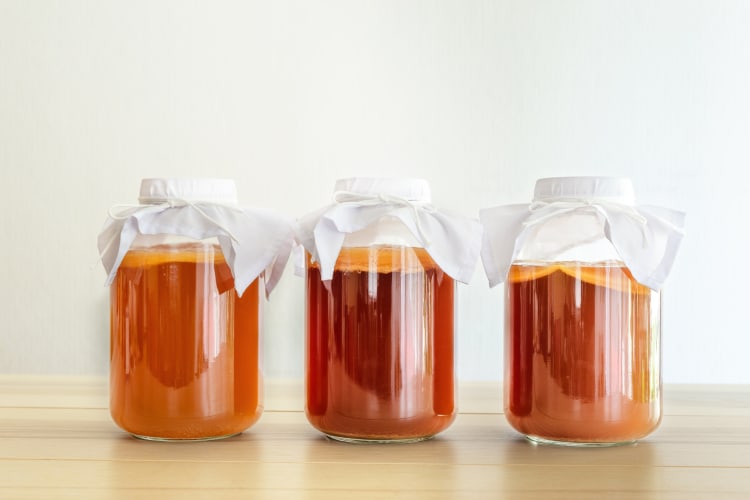
6. Hibiscus Tea
Hibiscus tea is a warm or iced, tart and floral beverage that many may not consider a healthy drink. Hibiscus provides polyphenols with antioxidant activity and early research suggests small reductions in blood pressure in some adults. It’s naturally caffeine-free and can be a refreshing daily option.
It’s also a hydrating choice with virtually no calories or sugar unless you add a sweetener. For fuller flavor, steep longer or add spices such as cinnamon or ginger, or finish with a small splash of 100% juice for tang.
For the healthiest beverage possible, brew hibiscus tea unsweetened and taste before adding any sweetener. Check labels on bottled versions to avoid added sugar. If you take blood pressure medicine or are pregnant, moderate intake and check with your doctor first since hibiscus can affect blood pressure and may interact with some medicines.
Hibiscus Tea Nutritional Overview (8-fluid-ounce serving, unsweetened):
- Calories: 0–2
- Protein: 0 grams
- Fat: 0 grams
- Carbs: 0.5 grams
- Total Sugar: 0 grams
- Caffeine: 0 milligrams
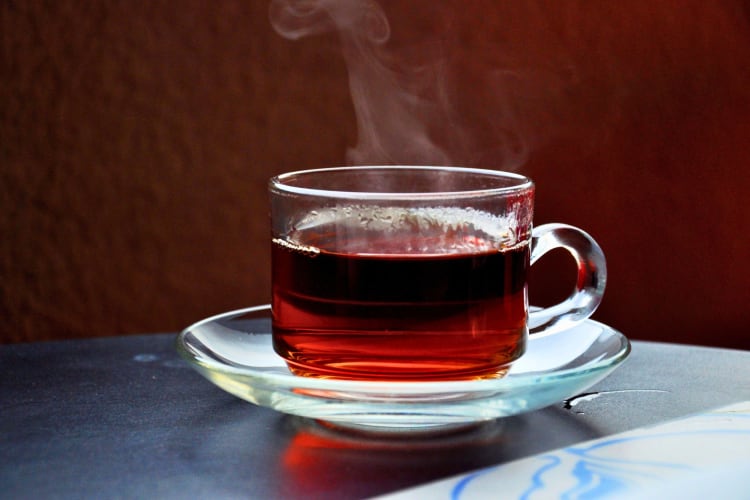
7. Smoothies
In your search for healthy drinks besides water, smoothies will surely spring to mind. When made with fresh greens, fruit, water and healthy yogurt — including non-fat yogurt, healthy Greek yogurt or low-calorie yogurt — smoothies can function as a refreshing and healthy drink. They're also especially easy to whip up at home when you’re first learning how to start eating healthy.
Smoothies can support digestive health, weight goals and fiber intake, as noted by Northwestern Medicine. They provide antioxidants and nutrients, are convenient on the go and offer a flavor-filled way to add hydration and steady energy when they’re balanced with protein and fiber. To get these benefits, learn how to make a smoothie that covers the nutritional bases.
The balanced healthy smoothie needs a combination of protein, such as non-fat Greek yogurt or whey protein and a plant-based fiber or fat, such as peanut butter. Work in extra vegetables by adding spinach or kale leaves to this tasty and nutritious healthy drink. One last tip from us is to skip large amounts of added sugars; lean on the natural sweetness of fruit, a sprinkle of cinnamon or a small drizzle of honey.
Among all healthy drinks, we usually enjoy smoothies the most because there are so many varieties to experiment with. Some of our favorites include dragon fruit smoothies, chia seed smoothies and mango banana smoothies. For portion control, aim for 8 to 12 ounces per serving. To make your life easier, make sure you get one of the best blenders for smoothies. Otherwise, you might end up chewing on chunks of fruit and vegetables with each sip.
Smoothie Nutritional Overview (8-fluid-ounce serving, made with non-fat Greek yogurt, mixed fruit and spinach):
- Calories: 120-150
- Protein: 8-12 grams
- Fat: 0-2 grams (0-3%DV)
- Carbs: 20-25 grams (7-9% DV)
- Total Sugar: 12-18 grams
- Caffeine: 0 milligrams
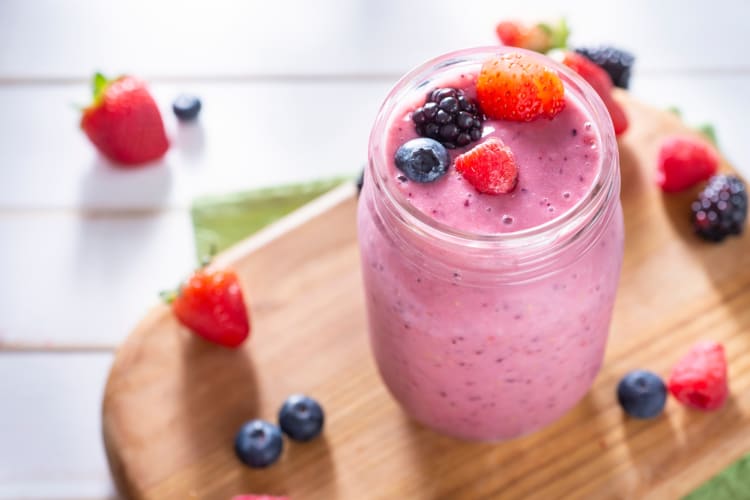
8. Low-Fat Milk
Milk provides several essential nutrients, including protein, carbohydrates and electrolytes. It’s also an excellent source of calcium, phosphorus, B vitamins and vitamin K, according to the British Dietetic Association, which are essential for bone health. If you enjoy a cold glass of refreshing milk, stick with 2% or 1% to keep the fat and calories down.
Let’s dissect the data for you: Full-fat milk has 150 calories and about 8 grams of fat. The 2% version has 129 calories per cup and 5 grams of fat. Finally, the 1% version has 102 calories per cup and 2.5 grams of fat, so as far as beverages that are healthy go, the 1% is a lower-calorie option that fits many goals. If you suffer from gastrointestinal issues, try lactose-free versions of this healthy drink.
Low-Fat Milk Nutritional Overview (8-fluid-ounce serving):
- Calories: 100-110
- Protein: 8 grams
- Fat: 2.5 grams (3% DV)
- Carbs: 12-13 grams (4-5% DV)
- Total Sugar: 12-13 grams
- Caffeine: 0 milligrams
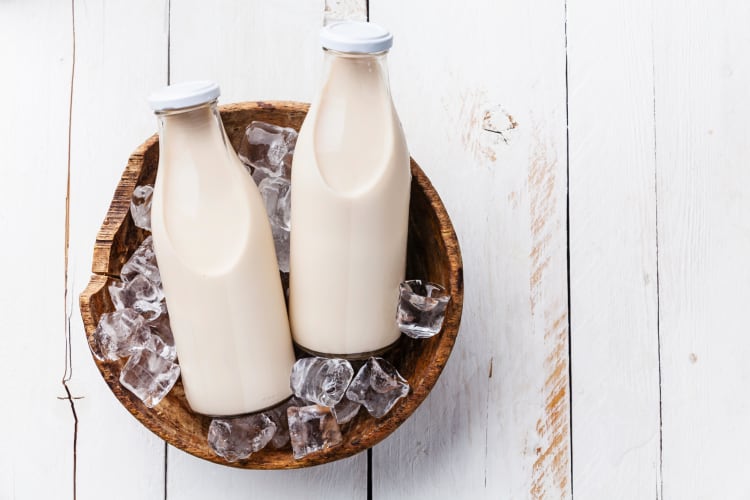
9. Herbal Tea
Herbal teas, such as mint, chamomile, ginger and peppermint, are wonderful, healthy drinks for those searching for a water alternative that still includes a lot of water. Herbal teas are usually caffeine-free, making them the best teas for sleep, offering calming effects that can help with anxiety and aid in relaxation.
It may also offer benefits, such as modest blood pressure reductions in some people and general immune support, depending on the herb. Some varieties have been studied for effects on cholesterol, allergy symptoms and inflammation, but findings are mixed.
Harvard Health notes that tea provides antioxidants and is linked to heart health. Because herbal tea can interact with medications, talk with your doctor or pharmacist if you take prescriptions.
You can make this healthy drink at home by bringing water to a boil, adding dried herbs or fruit and letting it steep before straining. Next, strain out the pieces and enjoy.
Herbal Tea Nutritional Overview (8-fluid-ounce serving):
- Calories: 0-2
- Protein: 0 grams
- Fat: 0 grams
- Carbs: 0-0.5 grams
- Total Sugar: 0 grams
- Caffeine: 0 milligrams

10. Tomato Juice
Natural tomato juice is a savory and delicious healthy drink you can enjoy when you don’t feel like drinking water. It offers vitamin C, lycopene and potassium, plus B vitamins and magnesium, and it’s about 94% water, so it’s hydrating.
Other benefits of this healthy drink, as noted by Verywell Health, include support for heart health markers with potential reductions in blood pressure and LDL cholesterol, and help with blood sugar management.
However, some may notice drawbacks, including high sodium in many brands, natural acidity that can trigger heartburn and higher potassium that may be an issue for people with kidney disease or certain medications, so we recommend choosing low- or no-sodium versions and checking with your doctor if you have concerns. For the healthiest healthy drink, look for short ingredient lists, keep portions to 4–8 ounces, or make your own to control salt.
Tomato Juice Nutritional Overview (8-fluid-ounce serving):
- Calories: 40–50
- Protein: 1–2 grams
- Fat: 0–0.5 grams
- Carbs: 9–12 grams (3–4% DV)
- Total Sugar: 6–9 grams
- Caffeine: 0 milligrams
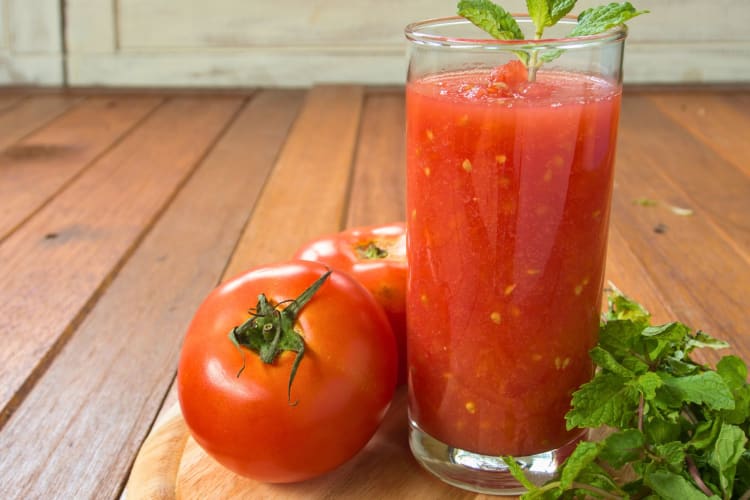
11. Kefir
Another fermented milk on this healthy drink list, kefir is a creamy, pourable, yogurt-like beverage and one of the healthiest soda alternatives for anyone who wants something tangy and satisfying. It contains calcium, vitamin D and magnesium for a healthy heart and strong bones, and it also offers more probiotics than other fermented dairy beverages.
It’s also rich in B vitamins, as well as Vitamin A, C and K, according to MedicineNet. Plus, it has an average of 10 grams of protein per serving, making it a great option for those looking for healthy drinks besides water that are high in protein.
This healthy drink supports gut health, which is linked to immune function, and is often lower in lactose than regular milk for those who may be sensitive. Kefir is made by adding kefir grains — tiny blobby bubbles that contain yeast and bacteria — to milk, including non-dairy options.
Many stores now sell it, which is the most convenient route, though you can also make it at home by fermenting it at room temperature and straining out the grains. Do note that kefir can cause digestive issues for some people, including bloating, constipation, diarrhoea or nausea, so drink in moderation.
Plain, Low-Fat Kefir Nutritional Overview (8-fluid-ounce serving):
- Calories: 100-120
- Protein: 9-11 grams
- Fat: 1-2 grams (2% DV)
- Carbs: 7-12 grams (3-4% DV)
- Total Sugar: 7-10 grams
- Caffeine: 0 milligrams
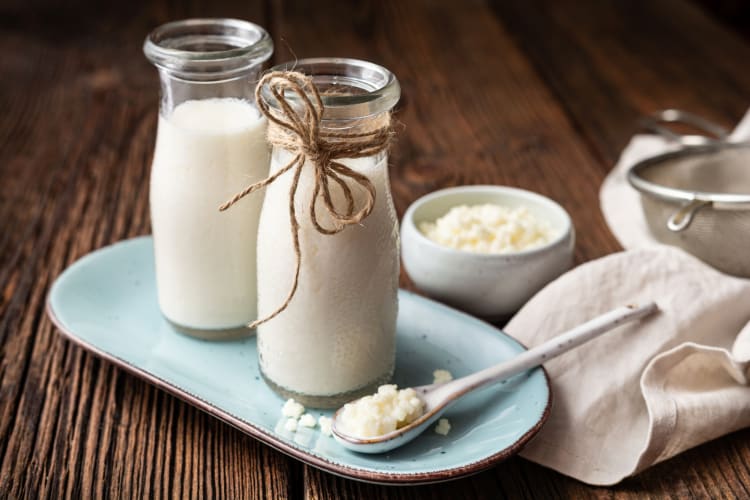
12. Coffee
If you’re an active person wondering, “What are the healthiest drinks?”, cold brew coffee can be one of the healthiest energy drinks to boost your next workout. Additionally, coffee helps fight inflammation, may lower dementia risk and can help reduce the risk of type 2 diabetes, as pointed out by Johns Hopkins Medicine.
Order it black, go with low-fat or plant-based milk and use cinnamon for flavor to keep the sugar content down. If you absolutely must, use a healthy coffee creamer sparingly. But if you’re able to resist the urge to use sugar, cream and sweet flavorings, this can be one of the best healthy drinks for get-up-and-go at any time of the day.
Excessive coffee intake may raise blood pressure and heart rate and can cause digestive issues in some people. Too much caffeine can lead to insomnia, anxiety and jitteriness and may interact with certain medications. Coffee contributes to daily fluid intake; any diuretic effect is usually mild.
Therefore, we recommend consuming this healthy drink in moderation, no matter how many coffee chains you walk past in a day. It’s also best to consult with your doctor if you're unsure whether or not your favorite brew is healthy for you.
Black Unsweetened Coffee Nutritional Overview (8-fluid-ounce serving):
- Calories: 2-5
- Protein: 0-0.3 grams
- Fat: 0 grams
- Carbs: 0-0.5 grams
- Total Sugar: 0 grams
- Caffeine: 95-140 milligrams
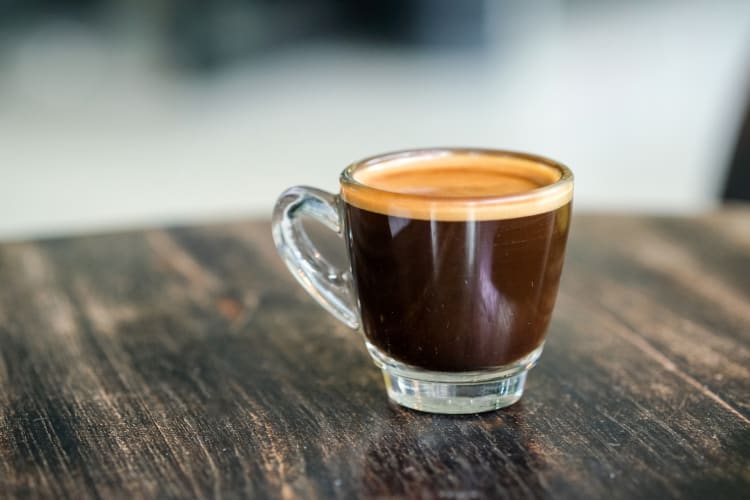
What Is the Healthiest Drink?
So, what are the healthiest drinks? Water tops the list, with filtered versions or the best bottled water leading the pack. But how much water should you drink a day? Most healthy female adults need about 11.5 cups and males should consume around 15.5 cups.
While needs vary, staying properly hydrated is essential. Add a spritz of lemon or a cucumber slice for extra flavor to make hitting your daily intake easier. Green tea is a popular next choice because it supplies polyphenols without adding many calories, fat or sugar.
The best drink for you still depends on your goal. If you need an energy lift, reach for a cup of black coffee, which also counts toward your daily fluid intake. If you want more protein, pour a glass of milk (about 8 grams per cup) or choose a lactose-free or low-fat version to match your dietary needs.

What Drinks Should I Avoid?
Now that we’ve looked at the healthiest beverages besides water, what about those you should be avoiding? If the two categories that spring to mind are alcohol and sodas, you’re spot on. As tempting as they are, both for taste and social acceptance reasons, the lack of healthy ingredients and intake of unhealthy ones is not worth it.
But what makes these drinks so bad for you? When it comes to soda, the main drawback is the amount of added sugar. Most cans of soda contain more than 35 grams of added sugar, which is already more than half of the recommended Daily Value.
Diet sodas reduce added sugar, though overall health impact varies by individual and intake. However, opting for the healthiest sodas, such as those made by Olipop and Poppi, is important to balance health with a treat. Look for the lowest-sugar sodas or sparkling drinks with little to no added sugar.
The problem with alcohol, on the other hand, is that it’s a diuretic, meaning it dehydrates you because it makes you urinate more often. Plus, there are the long-term problems that can come from frequent alcohol consumption, such as liver disease, heart disease and even brain damage. Alcohol is classified as a carcinogen and risk rises with intake.
Other unhealthy drinks you’re better off without include artificial fruit juices, energy drinks (especially high-sugar varieties and those with close to or over the daily recommended amount of caffeine) and sweetened teas, as well as sports drinks and sweetened milk beverages.
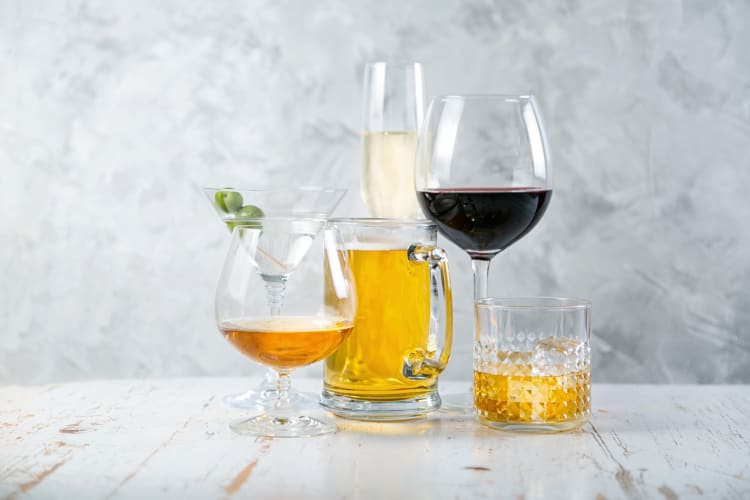
Have you discovered any healthy drinks besides water to add to your grocery list? The next time you’re looking for a refreshing beverage after a run, an intense yoga session or working in the garden, consider any of these healthy drink options that are sure to leave you refreshed.
For even more ways to explore your favorite foods, check out other experiences happening on Cozymeal.
